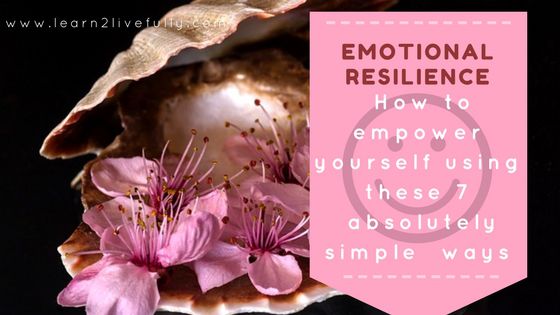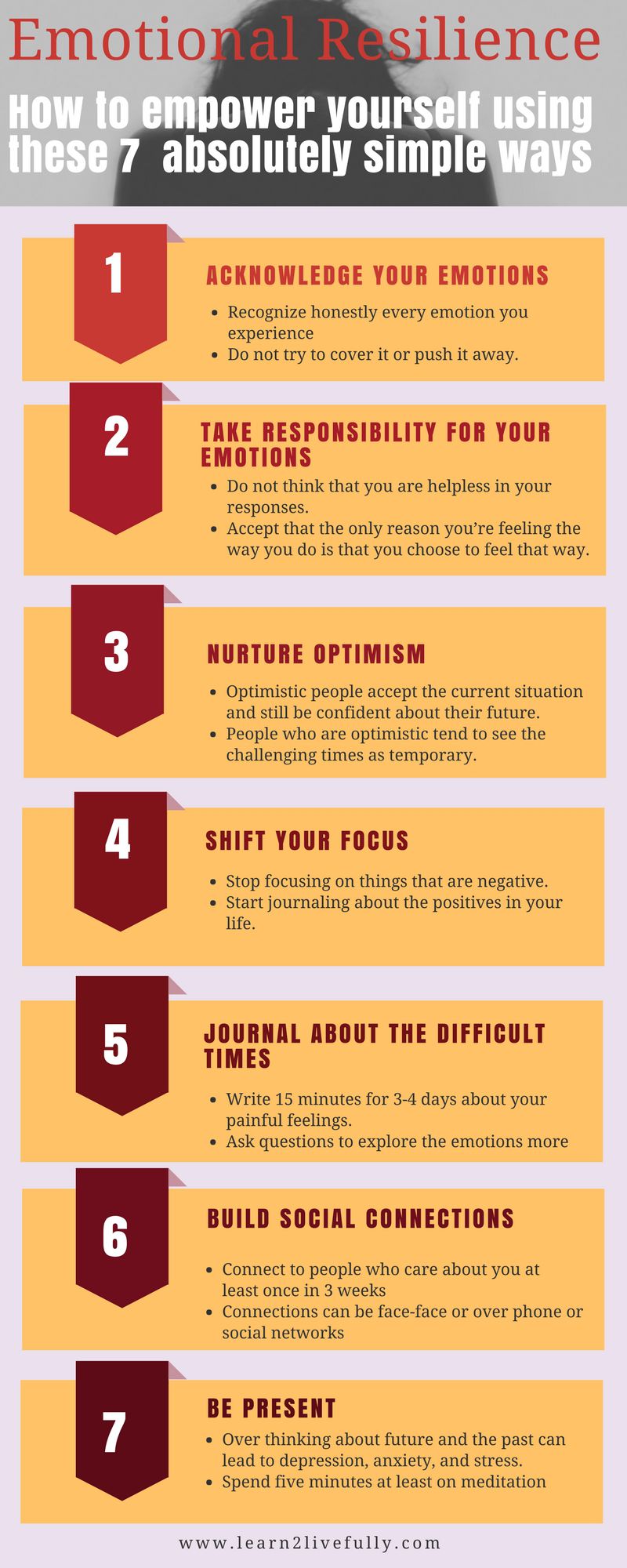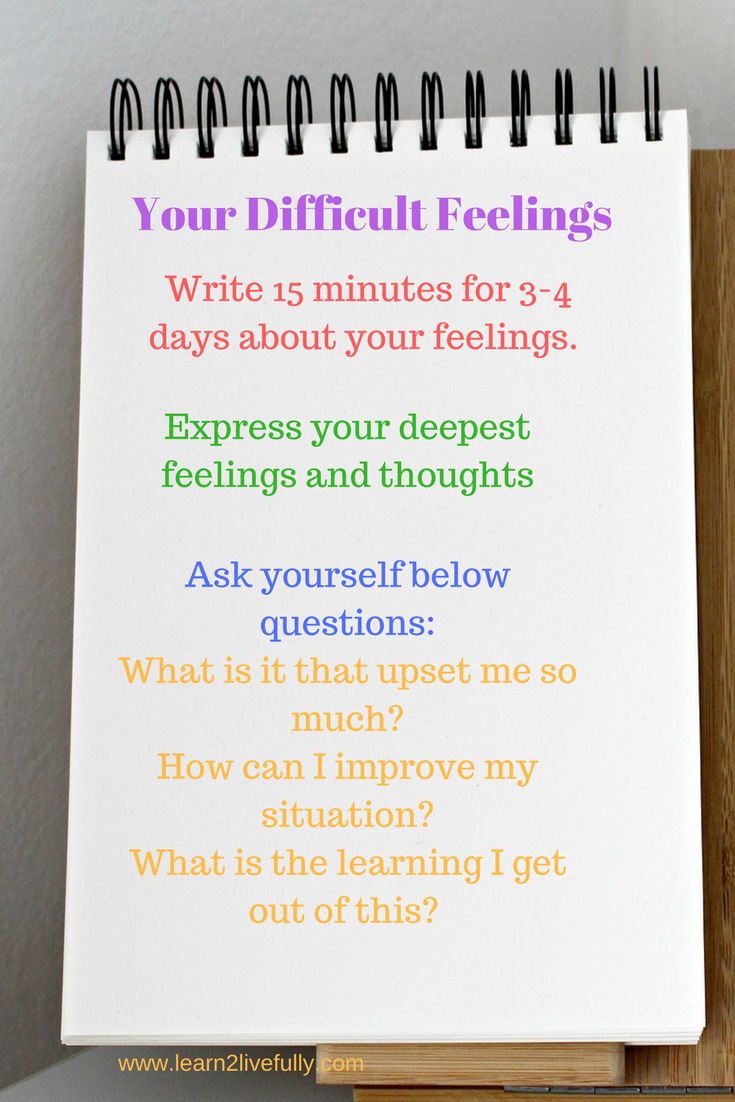Emotional Resilience: How to empower Yourself using these 7 absolutely simple ways
- By Nisha
- In Mind, Stress Management
- 2 comments

 We are interactive beings. We have thoughts, emotions and body interacting with each other. Have you noticed that whenever you get stressed out, you get a headache or upset stomach? Have you ever noticed that when you do not get enough sleep, you can’t be very friendly to others? Emotions affect not only our bodies but our overall wellbeing. In this article, I am sharing some strategies to help you build emotional resilience.
We are interactive beings. We have thoughts, emotions and body interacting with each other. Have you noticed that whenever you get stressed out, you get a headache or upset stomach? Have you ever noticed that when you do not get enough sleep, you can’t be very friendly to others? Emotions affect not only our bodies but our overall wellbeing. In this article, I am sharing some strategies to help you build emotional resilience.

We all deal with emotions on a daily basis.
[bctt tweet=” Emotions dictate not only what we do, but also how we do.” username=”Learn2LiveFully”]
Would you like to have a quick look the major points covered in this article? Watch below presentation.
What is Emotional Resilience?

According to American Psychological Association Emotional Resilience is the process of adapting well in the face of adversity, trauma, tragedy, threats or even significant sources of stress – such as family and relationship problems, serious health problems or workplace and financial stressors.
Emotional resilience involves choosing the thoughts and actions and feelings that enable us to perform at our best.
“Resilience is accepting your new reality, even if it’s less good than the one you had before. You can fight it, you can do nothing but scream about what you’ve lost, or you can accept that and try to put together something that’s good.”
― Elizabeth Edwards
Would you like to get FREE Self-improvement Tools in your mailbox? Please click here to subscribe to our newsletter.
Here are the seven strategies to help you improve your emotional resilience.

1. Acknowledge Your Emotions

Improving your emotional resilience starts with you recognizing honestly every emotion you experience. Whatever it is- joy, jealousy, happiness, annoyance, fear, loneliness— allow yourself to feel it. Do not try to cover it or push it away.
For example:
You and your husband agreed to go to watch your favorite film star’s latest movie in the evening. You are ready. But your husband came home late. You got angry with your hubby.
Were you angry? Most likely, you were hurt. But you covered that up with anger.
Many times, you feel ashamed of feeling hurt, so rather than allowing yourself to feel that way, you attempt to hide the hurt with anger. After all, admitting that you feel hurt would mean admitting that the offending individual’s opinion matters enough to affect you.
If you’re working toward emotional resilience, you should understand that covering up the actual emotion takes energy and effort. So, stop suppressing your feelings, it can backfire.
It’s vital that you allow yourself to acknowledge rather than suppress the emotions that come your way so that you can identify them accurately, learn more about them, and eventually improve your emotional resilience.
By acknowledging the emotions, you get the opportunity to take careful record of every feeling you encounter and move on to make a positive change.
2. Take Responsibility for Your Emotions

When it comes to our feelings, we typically tend to play the victim card. We think that we are helpless in our responses.
For instance:
John is on his way to the office on a Monday morning. He got stuck in an unexpected traffic and ended up 20 minutes late. Before the day had even gotten off to a real start, he was feeling frustrated, angry, and rushed, and he resented the traffic and other drivers on the road for making him feel that way.
What do you think? Isn’t John’s response an average response? Hmm. I agree that most of us will respond the same way as John in a similar situation. But then there’s hope!
We can choose how we feel, but that is possible only when we stop letting others control us and accept the responsibility for our emotions.
Read our article on let go of control here.
[bctt tweet=”Accept that the only reason you’re feeling the way you do is that you choose to feel that way.” username=”Learn2LiveFully”]
When something that someone else has said, or done upsets you, it’s all too natural to immediately pass blame for your hurt and anger to the offending person.
Instead, recognize that we’ve programmed ourselves to react a certain way to certain situations based on our preconceived beliefs and priorities. So, stop passing blame and accept responsibility for your emotions, because you do have a choice!
[bctt tweet=” Being responsible for your emotions helps you improve emotional resilience.” username=”Learn2LiveFully”]
3. Nurture Optimism

Optimistic people tend to live longer and heal faster. They have less anxiety and depression than pessimistic ones. Are you a pessimist? Do not worry! Optimism is something we can cultivate. Even if, you are a pessimist now, you can learn to be more optimistic.
Optimistic people are happy and positive people; they can accept the current situation and still be confident about their future.
People who are optimistic tend to see the challenging times as temporary. Whereas, pessimistic people think that their hassles are going to last forever.
Cynical people tend to use the words “always,” “never” more often. Because they believe that the difficult situations they are in are going to be lifelong. That is the reason why Pessimistic people suffer from depression and anxiety more than confident people.
A Pessimistic person will say about overeating during a healthy diet.
“I always fall off my diet.”
In the same situation, an optimistic person would say something like:
“I fall off my diet whenever I go to a party.”
4. Shift Your Focus
W e look at things at a certain way. We often tend to look at things that are negative.
e look at things at a certain way. We often tend to look at things that are negative.
For instance:
Nancy is doing a presentation, and one guy is sleeping. She starts to think that her performance is monotonous. Her focus is on the sleeping fellow. Maybe, he did not get enough sleep! But she begins to focus on the negative.
Why do we do this? Our tendency to focus on the negatives is an adaptation of our brain. It was very helpful during cave times, looking for life threatening things like tiger or stones. People having the ability to look for negatives could survive easily!
Look at another example:
Rob and Joy are colleagues. They got fired during a layoff. Rob says, “My career is over, and I’ll never be able to find a job as good as this one again!”
On the other hand, Joy says, “This is a blessing in disguise because now I can look for a new job, go back to school, or even start to think about my dream career of farming!”
The good news is that we can train our brains to look for positives. Start journaling about the positives in your life.
“Gratitude is the healthiest of all human emotions. The more you express gratitude for what you have, the more likely you will have even more to express gratitude for. “
– Zig Ziglar
Read our article on how to create the brain you want.
When you write about the positive things in your life, you should remember that small things in your life matter the most when it comes to happiness. Jot down the things you are grateful for in your life.
It could be the tea you just had. Or it could be the smile you received from a stranger on the way to the office. Appreciate the sunrise or sunset you saw today. Or note down the cozy bed you have in your bedroom.
Studies suggest that even if you are going through any type of hassles including permanent health issues, journaling about the positives helps you to be happy. So, you can improve your emotional resilience by shifting your focus to the positives in your life.
5. Journal about the Difficult Times

To acquire emotional resilience, you need to accept where you are right now in your life, even if you are going through difficult times.
 Start writing down about your painful feelings. Expressive Writing will help you to release the complex emotions.
Start writing down about your painful feelings. Expressive Writing will help you to release the complex emotions.
Many psychologists suggest writing using below strategy if you are going through a difficult time.
- Write 15 minutes for 3-4 days about your feelings. If you run out of things to write, repeat what you have written.
- While writing, make sure you express your deepest feelings and thoughts. You can write on your computer. As you are expressing your deepest emotions, you can delete it once you have written.
- Once you have written, ask yourself below questions:
What is it that upset me so much?
How can I improve my situation?
What is the learning I get out of this?
Sometimes, the answers may surprise you and give you a positive transformation. Even though you think, you can do nothing about the situation; you still can take some actions to improve your state.
Maybe, you can go for a walk. Listen to your music or talk to your best friend.
6. Build Social Connections
 Social connections are essential for our well-being. Finding a way to connect with others is important in increasing emotional resilience.
Social connections are essential for our well-being. Finding a way to connect with others is important in increasing emotional resilience.
Are you an introvert or a shy person? Do you find it hard to make new friends? Studies suggest that you do not need to have many social connections. Having able to connect to one person is enough. At least try to connect with the individuals who care about you once in three weeks.
Connections can be faces to face unions like going out with your friends to movies or restaurants. It can be phone calls or social network connections. Connection need not even be with humans. It can be with your pets or plants.
Read our article on how to build self-confidence here
7. Be Present

Do you often think about your future and past? Yes. We all do. It does help us to plan for the future and learn from the past events. But over thinking about the future and the past can lead to depression, anxiety, and stress.
To be present at the moment, spend five minutes at least on meditation. If you find it hard to sit and meditate, you may walk with just noticing the surroundings and label the things you see without any judgment.
Your emotional habits determine the quality of your life. Take control of your emotions by improving your emotional resilience. You can use any of these strategies to build your emotional resilience muscles. I hope these tips will help you to take charge of your emotions. Have you tried any of these strategies while handling any of the inevitable downturns of life? Please share your thoughts as comments.
- Share:
You may also like

How to Overcome Fear of Failure & Take Action with Confidence




Comments